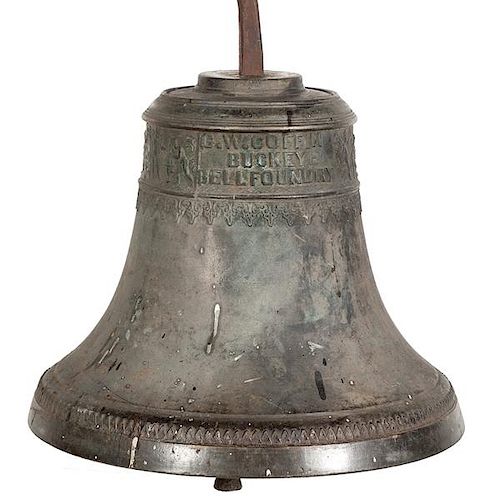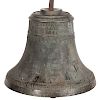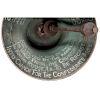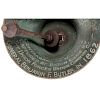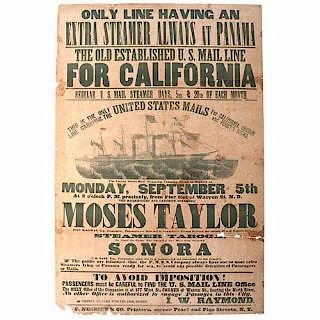Confederate Church Bell Captured at Baton Rouge by Union Forces Under Command of General Benjamin Butler
About Seller
6270 Este Ave.
Cincinnati , OH 45232
United States
With offices in Cincinnati, Cleveland and Denver, Cowan’s holds over 40 auctions each year, with annual sales exceeding $16M. We reach buyers around the globe, and take pride in our reputation for integrity, customer service and great results. A full-service house, Cowan’s Auctions specializes in Am...Read more
Two ways to bid:
- Leave a max absentee bid and the platform will bid on your behalf up to your maximum bid during the live auction.
- Bid live during the auction and your bids will be submitted real-time to the auctioneer.
Bid Increments
| Price | Bid Increment |
|---|---|
| $0 | $25 |
| $500 | $50 |
| $1,000 | $100 |
| $2,000 | $250 |
| $5,000 | $500 |
| $10,000 | $1,000 |
| $20,000 | $2,500 |
| $50,000 | $5,000 |
| $100,000 | $10,000 |
About Auction
Jun 10, 2016 - Jun 11, 2016
Cowan's Auctions dawnie@cowans.com
- Lot Description
Confederate Church Bell Captured at Baton Rouge by Union Forces Under Command of General Benjamin Butler
Church bell captured by General Benjamin F. Butler's men at Baton Rouge, LA, meant to be recast into a cannon. The inside of the bell has two painted inscriptions that read: This bell and other contraband of war was captured at Baton Rouge by Union forces under the command of General Benjamin F. Butler/ This bell is one of those collected by the Rebels in 1862 from the churches in Baton Rouge, La. to be recast into cannon for the Confederate Army. Formed by the G.W. Coffin Buckeye Bell Foundry, Cincinnati, OH. 17 in. ht., 21.5 in. dia. x 10.5 in. top.
Struggling to produce enough equipment for their army, the Confederacy took desperate measures to make bullets and cannons for the front lines including confiscating church bells to be recast. On his campaign through New Orleans, General Benjamin Butler and his men saved the church bell offered today from smelting. Butler became the military governor of the city of New Orleans and brought law and order to the city, but supposedly abused his power by pilfering the goods of the Southern households. A curious auction took place in Boston in 1862 for the sale of 418 of "Beauregard's Bells" supposedly saved from smelting. "The greater part of them were cast at the Buckeye Foundry, Cincinnati, though many were from foundries at New-York, West Troy, Pittsburgh and Louisville," explained a New York Times article (http://www.nytimes.com/1862/08/01/news/beauregard-s-bells-a-curious-auction-sale-in-boston.html). It is not known who profited from the sale, but it is very probable that the this bell was a part of that 1862 auction.
During his reign as military governor, Butler issued Order 28, which stated that any lady in New Orleans showing contempt for Union soldiers would effectively be treated as though she were a prostitute. Outraged, President Jefferson Davis labeled Butler an outlaw, which earned him the nickname “Beast Butler.” Butler was removed from his position as military governor of New Orleans and given command of the Department of Virginia and North Carolina in November of 1863. He resigned from that position in 1865 and started a political career as a Congressmen. Charges of corruption followed him throughout his political career. He died while attending court in Washington, DC in 1893.
AUCTIONEER'S NOTE: This remarkable souvenir of the Civil War weighs several hundred pounds and will require special arrangements for shipping.
Provenance: The M. Clifford (Cliff) and Lynne B. Young Confederate Blockade Runner CollectionSome soling on the outside of the piece, possibly paint drips.Condition
- Shipping Info
-
SHIPPING. At the request of the buyer, Cowan's will authorize the shipment of purchased items. Shipments usually occur within two weeks after payment has been received. Shipment is generally made via UPS Ground service. Unless buyer gives special instructions, the shipping method shall be at the sole discretion of Cowan's Auctions, Inc.. Cowan's is in no way responsible for the acts or omissions of independent handlers, packers or shippers of purchased items or for any loss, damage or delay from the packing or shipping of any property.
-
- Buyer's Premium



 EUR
EUR CAD
CAD AUD
AUD GBP
GBP MXN
MXN HKD
HKD CNY
CNY MYR
MYR SEK
SEK SGD
SGD CHF
CHF THB
THB